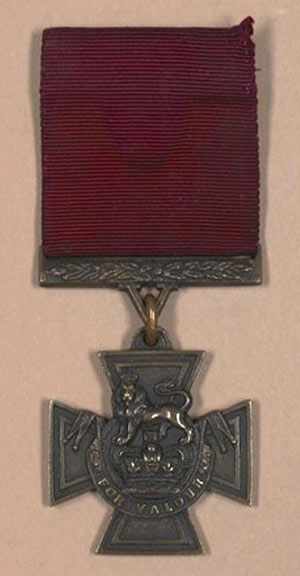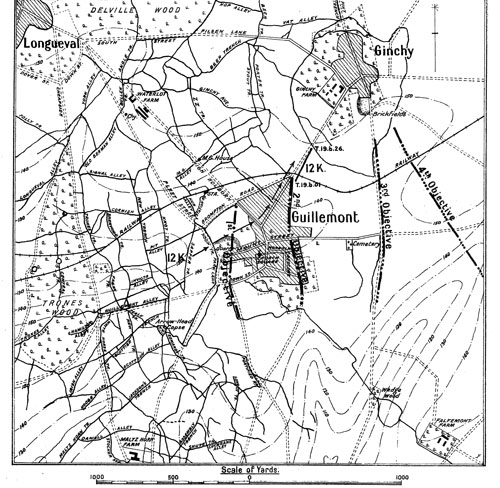
Guillemont after the September 1916 Somme battles
On 3 September 1916, after
four unsuccessful attacks on the village of Guillemont, the British Army, as part of a wider push, launched another assault. Once again, men from the
King’s Regiment were involved, this time from the 12th Battalion.
The Battalion had been in and out of the trenches to the west of the village from mid August and had already experienced some casualties. On 3 September, at 12 noon, the Battalion went ‘over the top’ to capture Guillemont. They moved through Trones Wood and across the exposed flat land to the west of the village. Their Brigade captured the north of the village, but it was a tough battle. The cost to the 12th Battalion for the ground gained was 187 casualties.

The Victoria Cross medal awarded to Sergeant David Jones
Early in the morning on 5 September, most of the Battalion left the Front Line for some much needed rest. Unfortunately their relief Battalion from the Border Regiment did not have any Lewis Machine Gun teams with them. Liverpool born Sergeant David Jones and two Lewis Gun teams from the 12th stayed behind as support. The Borderers moved forward and the platoon Jones’ team was attached to, came under heavy machine gun fire. The commanding officer and a number of men in the unit were killed. Sergeant Jones took command and led the remaining men forward to take their objective. For his actions in that attack, David was awarded the Victoria Cross (the highest gallantry award in Britain). His citation best describes the circumstances:
"For most conspicuous bravery, devotion to duty, and ability displayed in the handling of his platoon.
The platoon to which he belonged was ordered to a forward position and during the advance, came under heavy machine-gun fire, the officer being killed and the platoon suffering heavy losses.
Sergeant Jones led forward the remainder, occupied the position, and held it for two days and two nights without food or water, until relieved. On the second day, he drove back three counter-attacks, inflicting heavy losses. His coolness was most praiseworthy. It was due entirely to his resource and example that his men retained confidence and held their post."
David’s men withdrawing from the trenches, is the last action for the King’s Regiment in the capture of Guillemont Village. In the battle for that one village, the Liverpool Regiment lost almost 2000 men killed, and an unknown number of casualties. If you look at the scales on the maps that we have used in our blogs, that’s almost one Liverpool life lost for every yard gained. In the six week period between 23 July and 5 September 1916 the Regiment lost one eighth of their total number killed throughout the whole four-year war.

Map showing the final attack on Guillemont on 3 September 1916
David’s story after the battle is a short one. He never knew that he had been awarded the medal. He was offered leave after the battle, but chose to stay at the Somme with his men. Just a month later, on 7 October, he was killed at Bancourt. His widow, Elizabeth, accepted the medal from King George V at Buckingham Palace. The medal is now in Museum of Liverpool collections and is displayed in the
From waterfront to Western Front exhibition.
David’s large family is understandably proud of him and have been to the Museum to find out information. If you have relatives who you think served in the First World War come along to our event
A day to remember tomorrow, Saturday 3 September 2016, and maybe one of our expert historians can help you find out a little more about them!

 Guillemont after the September 1916 Somme battles
On 3 September 1916, after four unsuccessful attacks on the village of Guillemont, the British Army, as part of a wider push, launched another assault. Once again, men from the King’s Regiment were involved, this time from the 12th Battalion.
The Battalion had been in and out of the trenches to the west of the village from mid August and had already experienced some casualties. On 3 September, at 12 noon, the Battalion went ‘over the top’ to capture Guillemont. They moved through Trones Wood and across the exposed flat land to the west of the village. Their Brigade captured the north of the village, but it was a tough battle. The cost to the 12th Battalion for the ground gained was 187 casualties.
Guillemont after the September 1916 Somme battles
On 3 September 1916, after four unsuccessful attacks on the village of Guillemont, the British Army, as part of a wider push, launched another assault. Once again, men from the King’s Regiment were involved, this time from the 12th Battalion.
The Battalion had been in and out of the trenches to the west of the village from mid August and had already experienced some casualties. On 3 September, at 12 noon, the Battalion went ‘over the top’ to capture Guillemont. They moved through Trones Wood and across the exposed flat land to the west of the village. Their Brigade captured the north of the village, but it was a tough battle. The cost to the 12th Battalion for the ground gained was 187 casualties.
 The Victoria Cross medal awarded to Sergeant David Jones
Early in the morning on 5 September, most of the Battalion left the Front Line for some much needed rest. Unfortunately their relief Battalion from the Border Regiment did not have any Lewis Machine Gun teams with them. Liverpool born Sergeant David Jones and two Lewis Gun teams from the 12th stayed behind as support. The Borderers moved forward and the platoon Jones’ team was attached to, came under heavy machine gun fire. The commanding officer and a number of men in the unit were killed. Sergeant Jones took command and led the remaining men forward to take their objective. For his actions in that attack, David was awarded the Victoria Cross (the highest gallantry award in Britain). His citation best describes the circumstances:
The Victoria Cross medal awarded to Sergeant David Jones
Early in the morning on 5 September, most of the Battalion left the Front Line for some much needed rest. Unfortunately their relief Battalion from the Border Regiment did not have any Lewis Machine Gun teams with them. Liverpool born Sergeant David Jones and two Lewis Gun teams from the 12th stayed behind as support. The Borderers moved forward and the platoon Jones’ team was attached to, came under heavy machine gun fire. The commanding officer and a number of men in the unit were killed. Sergeant Jones took command and led the remaining men forward to take their objective. For his actions in that attack, David was awarded the Victoria Cross (the highest gallantry award in Britain). His citation best describes the circumstances:
 Map showing the final attack on Guillemont on 3 September 1916
David’s story after the battle is a short one. He never knew that he had been awarded the medal. He was offered leave after the battle, but chose to stay at the Somme with his men. Just a month later, on 7 October, he was killed at Bancourt. His widow, Elizabeth, accepted the medal from King George V at Buckingham Palace. The medal is now in Museum of Liverpool collections and is displayed in the From waterfront to Western Front exhibition.
David’s large family is understandably proud of him and have been to the Museum to find out information. If you have relatives who you think served in the First World War come along to our event A day to remember tomorrow, Saturday 3 September 2016, and maybe one of our expert historians can help you find out a little more about them!
Map showing the final attack on Guillemont on 3 September 1916
David’s story after the battle is a short one. He never knew that he had been awarded the medal. He was offered leave after the battle, but chose to stay at the Somme with his men. Just a month later, on 7 October, he was killed at Bancourt. His widow, Elizabeth, accepted the medal from King George V at Buckingham Palace. The medal is now in Museum of Liverpool collections and is displayed in the From waterfront to Western Front exhibition.
David’s large family is understandably proud of him and have been to the Museum to find out information. If you have relatives who you think served in the First World War come along to our event A day to remember tomorrow, Saturday 3 September 2016, and maybe one of our expert historians can help you find out a little more about them!
